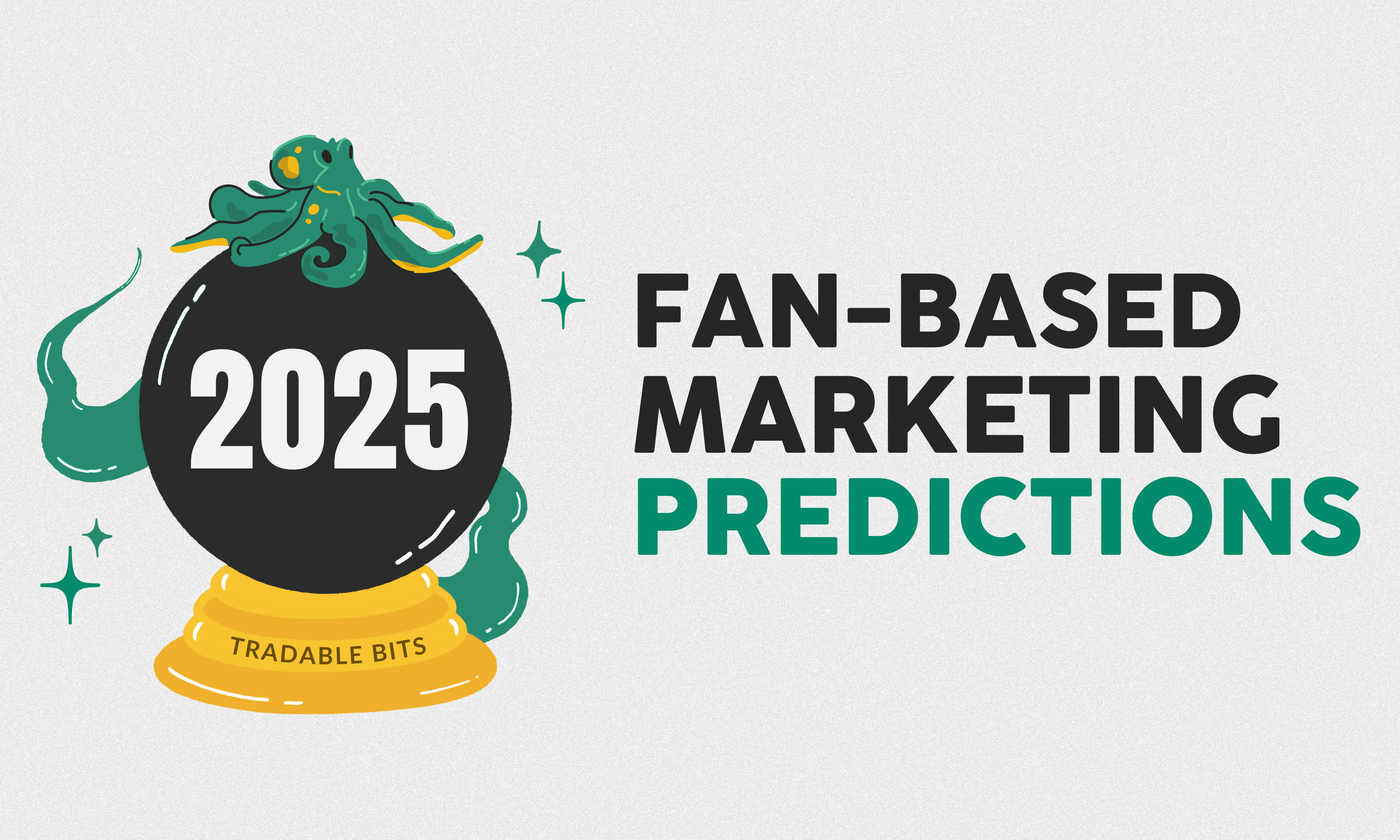With the “Caitlin Clark effect,” Brat summer, the Paris Olympics, and the grand finale of the Eras Tour, 2024 gave us a lot to talk about. While we don’t know exactly what 2025 will bring, it’s always fun to take our best guess! We asked some of the Tradable Bits team to dust off the old crystal ball and share their predictions for music, sports, and tech landscapes in the new year. 🔮
First, let's recap 2024:
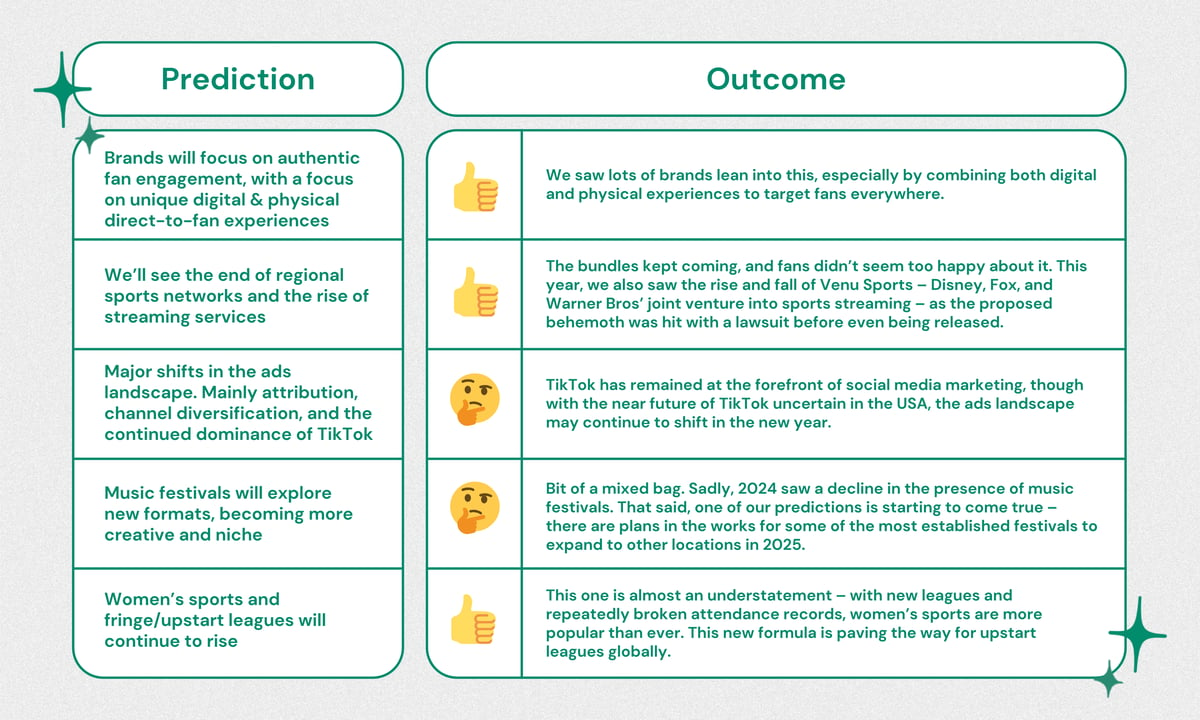
Now, the 2025 fan-based marketing landscape:
Out with the old and in with the new - let’s dive into our predictions for 2025! We compiled our team’s thoughts into the following pillars:
- The role of AI in our day-to-day
- The rise of community-based fan engagement
- Shifting strategies for attribution tracking
- More personalized direct-to-fan experiences
- Major moves in AR and VR
1. The role of AI in our day-to-day
Love it or hate it, AI is becoming a part of our everyday lives. Gone are the days of just asking questions to ChatGPT – we can anticipate organizations using all sorts of AI models to not only complete tedious tasks but transform how we create, consume, and interact with content.
Mild ☁️
"
Sports organizations will increasingly use AI to analyze fan behaviour and preferences to deliver highly personalized content, offers, and experiences.
Maurizio Barbieri (VP of Business Development, Asia)
Sports bodies have already started introducing AI into their engagement strategies. From recommending game highlights and personalized content based on a fan’s favourite teams, to suggesting merch to buy based on their interactions – fan data is at the forefront of this new wave of enhanced fan engagement.

As this type of personalization becomes more commonplace, data collection strategies will have to become increasingly centralized and actionable – but more on that in a few scrolls.
Medium ⛅️
"
AI music platforms will be providing soundscapes for films and commercials, and used by songwriters looking for either inspiration or assistance.
Shaun Verreault (VP of Music Business Development)
It’s easy to think technology won’t be able to match the authenticity of human creativity, but with the recent circulation of music deepfakes sounding so real they could fool you into thinking your favorite artist wrote them, it seems AI might be more in tune with its creative side than we realized (pun intended).
With AI becoming increasingly skilled at things like adaptive scoring, and the focus shifting toward more efficient and flexible creative processes, we predict this tool will gain popularity as a sort of co-writer or co-producer in 2025, helping save time and overcome creative blocks.
Hot ☀️
"
Commentary for highlights and games in the future will be delivered by generative AI, and fans will be able to select the style of commentary they prefer.
Lenny Goh (VP of Partnerships)
Imagine being able to customize your commentator the same way you can change your Siri settings on your iPhone. What if you could choose their voice, decide how detailed their analysis should be, control the speed of their updates, and even ask them specific questions about a player? AI commentators could make this a reality, allowing viewers to tailor their experience for a truly personalized and immersive broadcast.
This future isn’t far off – during their coverage of the 2024 Olympics, NBC used an AI-generated version of Al Michaels’ voice to provide commentary, showing that this level of customization is closer than we think.
2. The rise of community-based fan engagement
Community has always been the backbone of a thriving fanbase, but its importance is reaching new heights. In 2025, we can expect a fresh wave of innovation in how community-driven fan engagement is approached, redefining what it means to truly connect with audiences.
Mild ☁️
"
There will be an increased focus on community building for fan engagement, with greater reliance on omni-channel integrations to help bring people together.
Selena Neumark (Director of Product)
Think of the “Taylor Swift approach” – Taylor has created a brand for herself that is executed seamlessly across every touchpoint. From her social media content to the activations at her live shows. She has perfected the art of crafting a cohesive world and a shared experience for her fans, and many artists are beginning to follow suit, recognizing that this approach is effective in driving genuine real-world engagement.
In fact, it’s becoming clear that simply launching a campaign might not be quite enough for success. It's about weaving a compelling storyline that captures attention, builds anticipation, and keeps fans invested.

Medium ⛅️
"
The rise of a community-based model for engagement will dim the focus on “superfans.”
Anonymous 👀
The key difference lies in value addition versus value extraction. The superfan model primarily targeted those willing and able to spend the most money, which has started to feel less authentic, as it often seems like another way to drive sales. Moving forward, artists will place more emphasis on nurturing smaller, highly engaged fan communities, where the focus is on providing value to their true fans rather than the ones who make the most purchases.
Hot ☀️
"
Women’s sports will be the answer in 2025 to the Youth/Gen-Z Connection Crisis in sports.
Khevyn-Lynn Gormley (BD Manager, Women's Sports Lead)
With record-breaking attendance, soaring viewership, and massive new media deals, younger women are gravitating toward women’s sports more than ever for two key reasons: representation and authenticity. Female athletes and teams are leveraging their platforms to address important topics – from pay equity to mental health – that deeply resonate with younger audiences. By sharing this content on social media, they foster a two-way connection with their fans that feels genuine and community-driven rather than corporate – a dynamic proving to be a powerful driver of both engagement and loyalty.
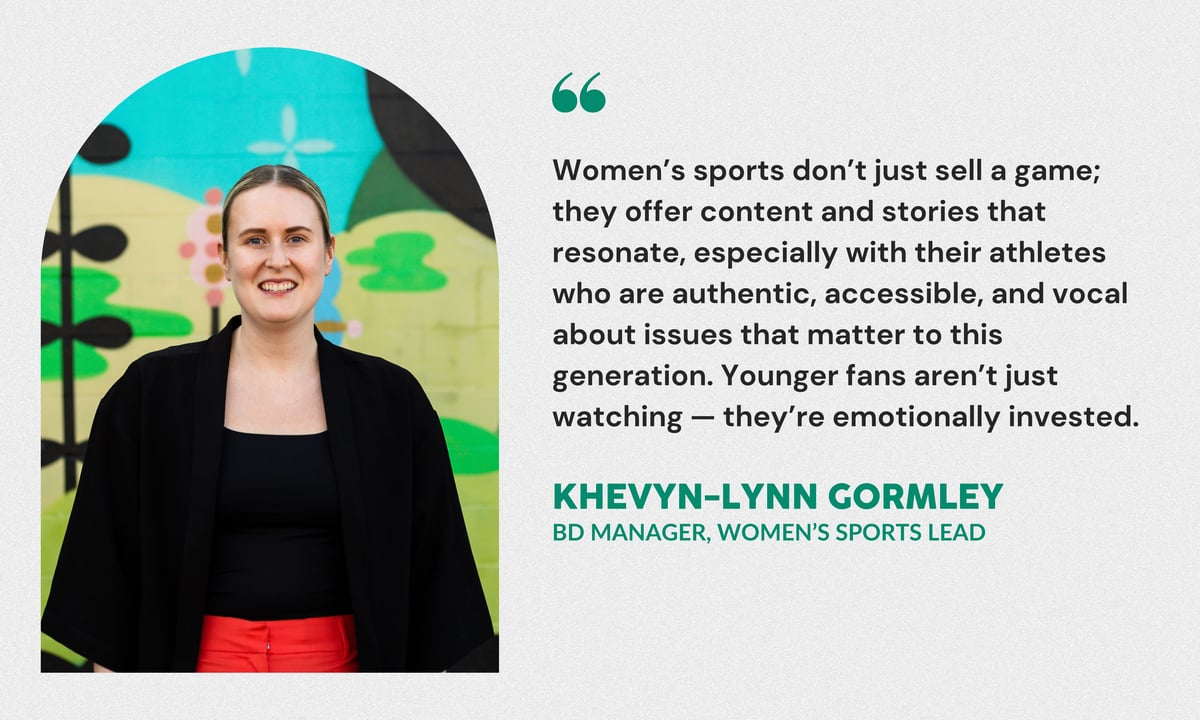
3. Shifting strategies for attribution tracking
The increasing trend of third-party cookie blocking in 2024 — and plans still in the works for Google to phase them out in 2025 – has definitely caused a bit of a stir in the marketing world. While we don’t think a cookie comeback is on the horizon for this year, we’ve got some ideas about how things might shake out as companies continue to adjust.
Mild ☁️
"
Attribution tracking will become increasingly difficult across marketing efforts.
Jordan Pink (Senior Customer Success Manager, Sports)
Attributing conversions in a post-iOS world is already tough. With cookies being supported less and less across browsers, tracking a fan’s journey across devices is becoming more and more complicated - and getting a clear picture of how campaigns drive results will require some new thinking.
Medium ⛅️
"
Everyone will be tuned into the developing CAPI landscape.
Shaun Verreault (VP of Music Business Development)
On the bright side, Facebook’s Conversions API (CAPI) technology is stepping in where cookies fall short, giving companies a more reliable way to track conversions while respecting privacy advisories. With third-party data becoming trickier to work with, CAPI solutions are allowing companies to measure ROI in a more privacy-conscious world. Looking ahead, we’ll likely continue to see more companies adapting to this technology and cementing it as the standard.
Hot ☀️
"
First-party data will be crucial for targeting purposes and attribution tracking of conversions.
Jordan Pink (Senior Customer Success Manager, Sports)
With so many ad platforms now offering CAPI, first-party data will be more important than ever. As third-party data becomes harder to come by, companies will lean more on data collected from direct-to-fan interactions. While first-party data might not be as easily shareable as third-party data, it provides valuable insights straight from the fans themselves (and addresses some of the ethical concerns that come with third-party cookies – which is a nice bonus).
4. More personalized direct-to-fan experiences
In this new age of entertainment, it’s no longer just about filling the seats — it’s about creating an unforgettable in-venue experience that feels like a bucket-list item or must-visit destination. In 2025, expect to see venues stepping up their game with creative, personalized, and fan-focused experiences that truly leave a lasting impression and keep fans coming back for more.
Mild ☁️
"
There will be more of an effort made by sports teams to understand the fans consuming content over broadcast, personalize broadcast experiences for these fans and ultimately, monetize them.
Jordan Pink (Senior Customer Success Manager, Sports)
Think about it: watching a game over broadcast is three or more solid hours of your fans’ attention - and in today’s attention economy, that time is gold. The more engaging and fan-focused your content, the more effectively you can use that airtime. Sports organizations are realizing those breaks in plays shouldn’t just be background noise – they’re an opportunity to have a one-to-one interaction that provides them real value through things like live gamification and personalized offers that will move them more naturally to the point of conversion - a win-win.
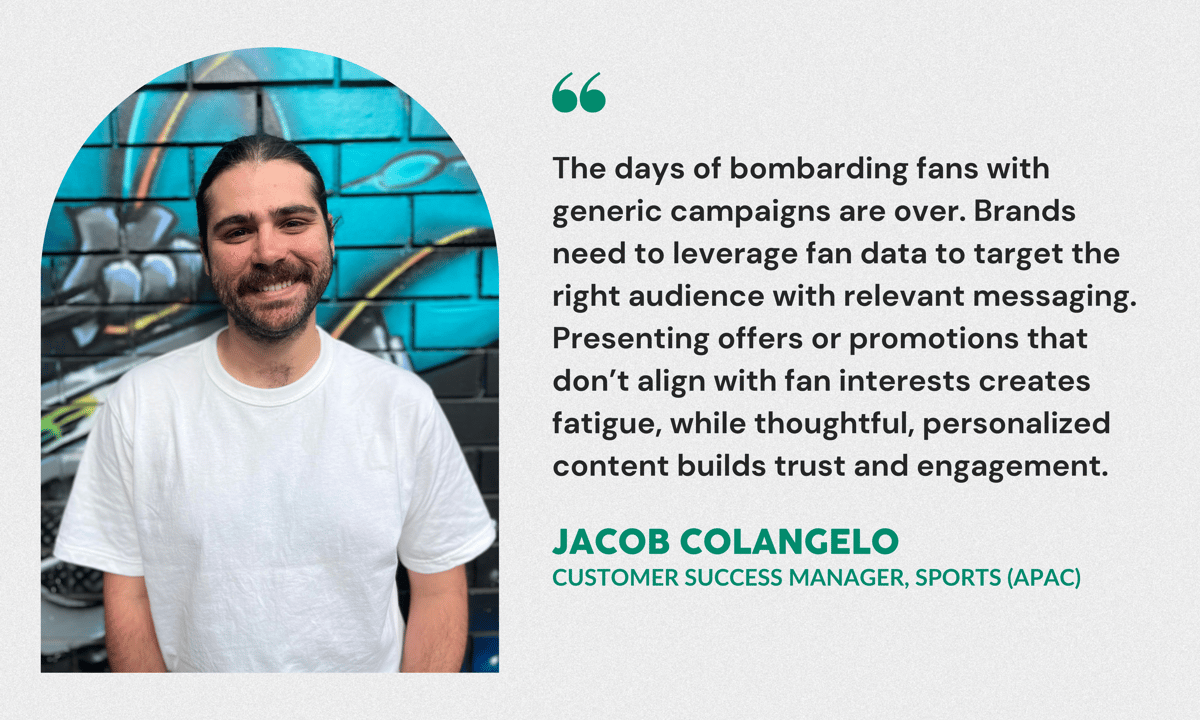
Medium ⛅️
"
Hyper-personalized direct-to-fan experiences will be enhanced by the centralization of PII into secure, fan-centric data hubs that activate against fan data on a real-time basis.
Geoff Robins (VP of Product and Marketing)
You can’t have personalization without getting to know your fans first – so the continued use of fan data will no doubt be at the forefront of 2025. What we predict will be crucial in the new year is the need for fan data to be immediately actionable. Entertainment organizations will turn their focus to centralized data hubs that turn insights into action right away, allowing them to roll out strategic campaigns across any channel and connect with fans right as the data rolls in.
We may be biased, but we think this one’s pretty important.
Hot ☀️
"
The focus on personalization will revitalize the interest in fan loyalty.
Lenny Goh (VP of Partnerships)
Getting people out of the comfort of their homes these days isn’t easy. Just 1% of sports fans under 40 attend games in person, with 99% preferring to watch from the comfort of home or elsewhere. Streaming technology has reshaped how we consume sports, and it's having a major impact on the culture of live sports. But we think personalization will be the key to turning this around.
Take the new $2 billion Intuit Dome, for example. This smart stadium is setting a whole new standard for fan engagement, offering an experience that goes far beyond the traditional event space. With interactive seat buttons for on-screen games, audio recognition technology that can spotlight the loudest individual fans, and a massive 40,000-square-foot double-sided Halo Board, even fans sitting way in the back will feel like they’re court-side. This venue is offering something fans can’t get at home or in a sports bar – an experience that’s definitely worth showing up for. We predict that in 2025, personalized in-venue experiences like this will be the spark that reignites fan loyalty to live games and gets them back in the stands.
5. Major moves in AR and VR
As we look to 2025, AR and VR are no longer just buzzwords – they’re here, and they’re advancing more quickly than ever. With immersive technology becoming more accessible, we’re confident they will make major waves in fan engagement in 2025.
Mild ☁️
"
More fans will be using AR on their devices in-venue to access live player stats, fantasy scores, and interactive content like augmented fan zones.
Josh Whelan (Customer Integrations Manager, APAC Sports)
Imagine wandering through a stadium, using your phone to scan different spots to unlock exclusive content or special offers – kind of like Pokémon GO, but for sports fans (though hopefully less controversial). It’s clear just how enticing AR can be, and we think more venues will start experimenting with it in 2025 to boost fan engagement.
We’re also expecting brands to jump on board, using this technology as a creative way to power sponsorships.
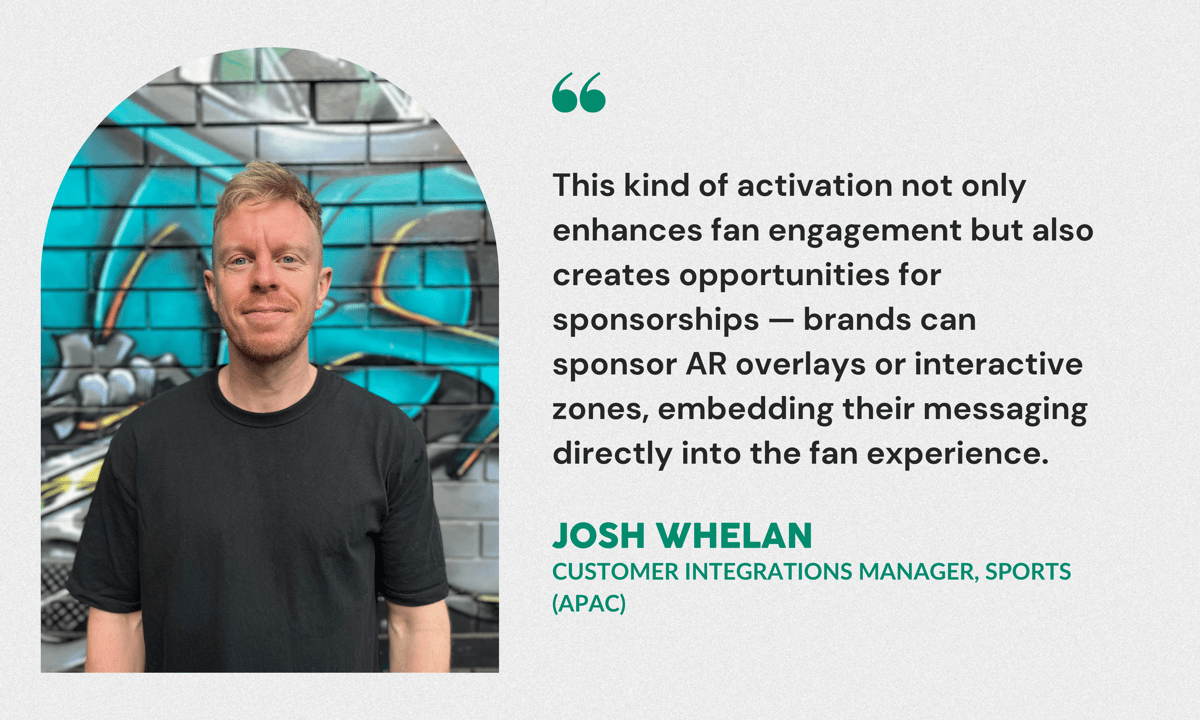
Medium ⛅️
"
Stadiums could roll out exclusive VR experiences, allowing at-home fans to feel like they’re right there in the stadium, soaking up the atmosphere without leaving their house or the pub.
Josh Whelan (Customer Integrations Manager, APAC Sports)
We know we just talked about how fans watching from home is having an impact on live event culture. But since virtual viewing won’t be going away anytime soon, how cool would it be to bring the stadium experience to fans who can’t be there? With brands like Apple getting into the VR space (commercial success or not), it’s clear that VR has the potential to have a serious future in the at-home viewing space – bringing the excitement of the live, in-venue atmosphere of a game or concert directly to fans wherever they are in the world.
This kind of feature could also open up revenue opportunities by offering exclusive experiences that are hard to pass up: like VR season passes or premium experiences like being able to "sit" in a virtual coaches box.
Hot ☀️
"
AR and VR could evolve to provide fans with holographic replays or even the ability to view games from a player’s perspective.
Maurizio Barbieri (VP of Business Development, Asia)
Imagine using a headset or smartphone to watch a game-winning goal as if you were in the net or seeing a 3D replay of a controversial play projected right in front of you. These features could even include interactive elements, allowing fans to analyze plays from different angles or “step into” the action themselves. This would be a must-try, out-of-body experience, and we’re hoping this technology will make its way further into to the event space this year.
And just like the clock striking midnight, that's a wrap on our 2025 predictions! 🎉
Wishing you all another year of data-driven insights and engaged fans. We can’t wait to see what this year has in store.
Have any hot takes of your own? ☀️ Give us a shout on our socials! (@tradablebits) 🐙
Looking for monthly marketing tips and tricks? Sign up for our newsletter!
